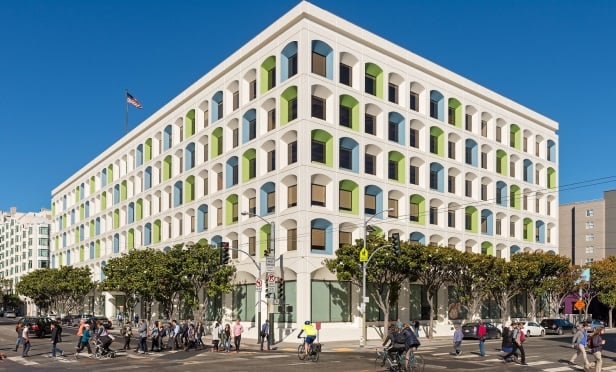 795 Folsom is next to Moscone Center and across the street from the future Central Subway station.
795 Folsom is next to Moscone Center and across the street from the future Central Subway station.
SAN FRANCISCO—A class-A office building at 795 Folsom St. is near an abundance of renovated properties and proposed construction in SOMA. The property is situated at the corner of 4th and Folsom Streets adjacent to the newly renovated Moscone Center, across the street from the future Central Subway station, and just three blocks from Caltrain and BART/Muni lines.
Financing of $100 million was recently acquired for the asset. ASB Real Estate Investments secured the five-year fixed-rate loan from Capital One at a 3.478% interest rate. The loan was secured on behalf of ASB's Allegiance Real Estate Fund, a core investment vehicle, as part of the investment firm's strategy to take advantage of favorable interest rates.
“The Capital One loan is well-timed to lock in attractive financing on a strong, income-producing core asset,” says Aaron Duncan, ASB's senior vice president for the West Coast region.
The six-story 189,000-square-foot office building was built in 1977, renovated in 1999 and acquired by ASB in 2013. Union Property Capital assisted ASB Real Estate Investments with the acquisition, and continues to facilitate leasing and oversee property management.
“This financing is part of a fund initiative to increase the fund's leverage to its target,” Duncan tells GlobeSt.com.
The building features high ceilings and the type of interior features valued by creative office tenants. With its four sides of window lines, creative build-outs and 33,000-square-foot floor plates, the building is well positioned to serve the needs of today's office or technology users. The LEED Gold-certified office building is leased to tenants including AT&T, Kabam and Regus.
While traditional lenders for office investors have indicated taking a step back in commercial real estate lending due to risks associated with increased construction costs, REITs have rapidly increased lending for commercial real estate purchases, according to a report by Kidder Mathews. Due to the strong returns from the sales of office property in San Francisco, REITs and other non-bank lenders are expected to play a significant role in lending this year, as traditional bank lenders pull back.
Credit quality of the loans from these non-traditional sources remains strong, but observers have noted that these non-bank loans do have a higher default rate than loans from traditional banks. However, due to new accounting regulations that have gone into effect this year, these non-bank lenders will be required to set aside more capital to cover potential defaults, says Kidder Mathews.
© Touchpoint Markets, All Rights Reserved. Request academic re-use from www.copyright.com. All other uses, submit a request to [email protected]. For more inforrmation visit Asset & Logo Licensing.







